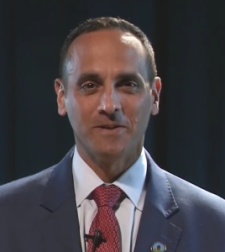
Joe Curtatone. Photo (cc) 2019 by the Somerville Media Center.
The state Supreme Judicial Court on Monday issued an important — and, to me at least, surprising — clarification of the Massachusetts wiretapping law, ruling that it’s not necessary to obtain someone’s consent before recording them. All that’s needed, the court said, is to inform the second party that they’re being recorded. That doesn’t change even if the person making the recording lies about their identity. Here’s Travis Andersen’s account in The Boston Globe.
The case involves Kirk Minihane of Barstool Sports, who in 2019 recorded an interview with Somerville Mayor Joe Curtatone by claiming to be Globe columnist Kevin Cullen. Minihane then played the interview on his podcast. Curtatone sued, arguing that he would not have agreed to being recorded if he had known he was speaking with Minihane rather than Cullen. Justice Frank M. Gaziano writes:
Minihane did not secretly hear or record the challenged communication within the meaning of the act, because the plaintiff knew throughout the call that his words were being heard and recorded. The identity of the party recording the communication or, indeed, the truthfulness with which that identity was asserted is irrelevant; rather, it is the act of hearing or recording itself that must be concealed to fall within the prohibition against “interception” within the act.
And here’s Gaziano’s conclusion:
Because Minihane did not secretly record his conversation with the plaintiff, the challenged recording does not fall within the statutory definition of an “interception” within the meaning of the Commonwealth’s wiretap act. The plaintiff thus has not made factual assertions sufficient to state a cause of action upon which relief can be granted.
The first indication of where the case might be headed came earlier this year, when the ACLU and the Reporters Committee for Freedom of the Press filed a brief in support of Minihane and Barstool.
Massachusetts has often been described as a “two-party consent” state when it comes to recording conversations. But even before Minihane recorded Curtatone, it was clear in some legal circles that the word “consent” was misleading. For instance, here is an explanation of the law published several years ago by the now-defunct Digital Media Law Project at Harvard’s Berkman Klein Center for Internet & Society:
Massachusetts’s wiretapping law often referred to is a “two-party consent” law. More accurately, Massachusetts makes it a crime to secretly record a conversation, whether the conversation is in-person or taking place by telephone or another medium…. Accordingly, if you are operating in Massachusetts, you should always inform all parties to a telephone call or conversation that you are recording, unless it is absolutely clear to everyone involved that you are recording (i.e., the recording is not “secret”). Under Massachusetts’s wiretapping law, if a party to a conversation is aware that you are recording and does not want to be recorded, it is up to that person to leave the conversation.
Even after Monday’s SJC ruling, the law in Massachusetts remains unusually strict. According to the law firm Matthiesen, Wickert & Lehrer, 38 states plus the District of Columbia merely have a “one-party consent” law. Since the person making the recording has obviously given their consent, that means recording someone secretly in those states is legally permissible.
I tell my students that if they want to record an interview, whether in person or by phone, to ask for the subject’s consent. Then, after they turn on their recorder, tell them that they’re now recording and ask if that’s all right. That way, not only do they have the interview subject’s permission, but they have that permission on record. Minihane’s victory doesn’t change the ethics of recording someone without their knowledge.
One aspect of Monday’s ruling worth thinking about is that two-party consent, even under a looser definition of “consent,” can make it harder to engage in certain types of investigative reporting. Minihane obviously was just recording Curtatone for entertainment purposes. But undercover reporting, though less common than it used to be (thanks in part to the Food Lion case), can be a crucial tool in holding the powerful to account.
In Massachusetts, it remains illegal for a reporter to secretly record someone. The SJC’s decision doesn’t change that.
Become a member of Media Nation for just $5 a month.





